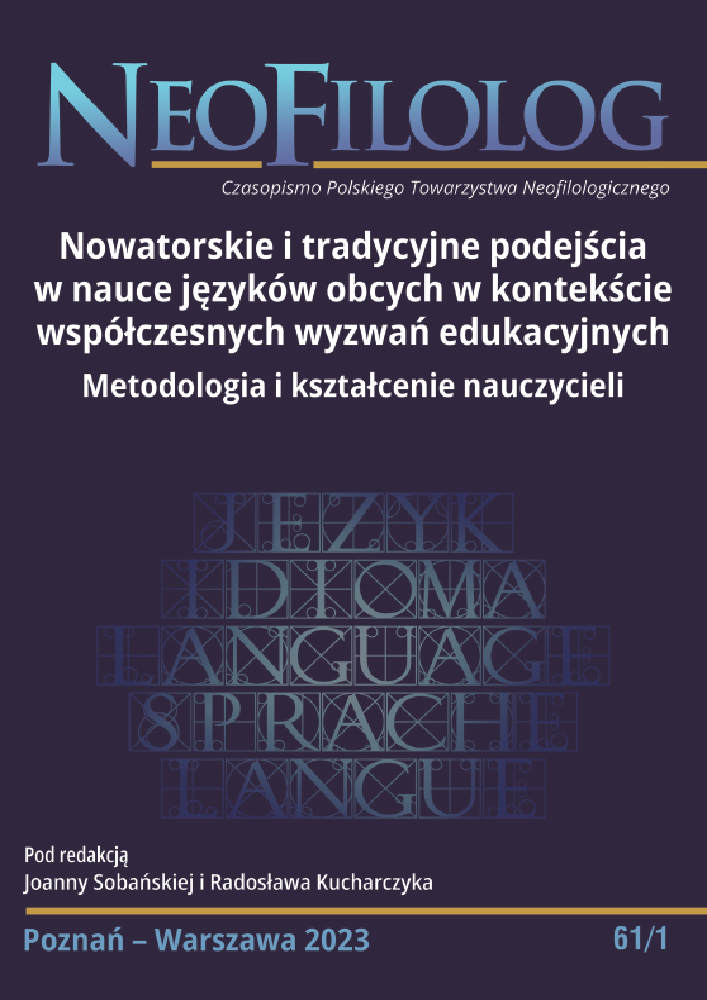Résumé
This paper presents a small-scale empirical study which included 21 senior-year students of German as a major who took a course on the methodology of teaching German as a foreign language in the spring semesters 2020 and 2021, at the Faculty of Philology at the University of Belgrade (Serbia). The students were encouraged to read several articles by the Austrian educational philosopher Konrad Paul Liessmann and to record their reflections on the possible effects of the commercialization of purpose-oriented knowledge. The articles in question are based on Liessmann’s so-called “Theory of Uneducation”. The students’ tasks were analyzed and discussed, with the focus on their statements regarding the following aspects: a) possible challenges, opportunities and dangers of unavoidable digitization and mechanization in everyday life and at school, and b) the changing roles and tasks in the educational context. All this more or less aims at application-oriented knowledge management. The participants supported Liessmann’s thesis that education is losing value through commercial exploitation, accumulation of TV quiz knowledge and extensive testing and examining. However, his skepticism with regard to digitization in the school system and his plea for more traditional canons of school subjects were mostly met with disapproval by the participants.
Références
Anderson R.D. (2004), European Universities from the Enlightenment to 1914. Oxford: Oxford University Press. DOI: https://doi.org/10.1093/acprof:oso/9780198206606.001.0001
Hörisch J. (2006), Die ungeliebte Universität. Rettet die Alma mater. München: Carl Hanser Verlag.
von Humboldt W. (1980), Werke in fünf Bänden. Schriften zur Anthropologie und Geschichte. Herausgegeben von Andreas Flitner und Klaus Giel. Stuttgart: Cotta´sche Buchhandlung.
von Humbolt W., Adorno T., Lisman K.P. (2020), Od obrazovanja do neobrazovanja. Tri teorije. Beograd: Akademska knjiga & IFDT.
Hüther G., Heinrich M., Senf M. (2020), #Education for Future. München: Goldmann Verlag.
de Konenk T. (2007), Filozofija obrazovanja. Beograd: Clio.
Komenski J. (1997), Velika didaktika. Beograd: Zavod za udžbenike i nastavna sredstva.
Lederer B. (Hrsg.) (2013), „Bildung“: was sie war, ist, sein sollte. Zur Bestimmung eines strittigen Begriffs. Fortführung der Diskussion. Baltmannsweilser: Schneider.
Lederer B. (2014), Kompetenz oder Bildung. Innsbruck: innsbruck university press.
Liessmann K.-P. (2010), Theorie der Unbildung. Die Irrtümer der Wissensgesellschaft, München: Piper Verlag.
Precht R.D. (2013), Anna, die Schule und der liebe Gott. Der Verrat des Bildungssystems an unseren Kindern. München: Goldmann Verlag.
de Romilly J. (1991), Écrits sur l´enseignement. Paris: Édition de Fallois.
European Bildung Network (2020), “Bildung”. Online: https://europeanbildung.net/bildung/
Rousseau J.-J. (1762), Émile ou l’éducation. Livres I et II. Online: https://ebooks-bnr.com/ebooks/pdf5/rousseau_emile_ou_education_livres1et2-a5.pdf [abgerufen am 23.8.2022].
Quellenverzeichnis für Liessmanns Artikel und Aufnahmen (letzter Aufruf im August 2022):
„Was ist Bildung? Von welcher Lebensschulung profitieren unsere Kinder?“ https://bildung-wissen.eu/wp-content/uploads/2019/09/Liessmann-9-2019.pdf
„Der Wert der Bildung und die Bildung von Werten“ https://www.ufg.at/fileadmin/media/institute/kunst_und_gestaltung/bildnerische_erziehung/materialien_und_links/Einzeltexte/Referat_C.P._Liessmann.pdf
„Theorie der Unbildung. Die Irrtümer der Wissensgesellschaft“ (Kapitel: „Wer wird Millionär oder: Alles was man wissen muss“) https://homepage.univie.ac.at/konrad.liessmann/Unbildung.pdf
Geisterstunde: Die Praxis der Unbildung (Kapitel: Pisa, Panik und Bologna) https://files.hanser.de/Files/Article/ARTK_LPR_9783552057005_0002.pdf
Prof. Dr. Konrad Liessmann spricht über die Herausforderungen der Digitalisierung https://www.youtube.com/watch?v=J7HQpFk7REA&t=193s
Konrad Paul Liessmann: Die verblassende Idee von Bildung (NZZ Standpunkte 2014) https://www.youtube.com/watch?v=IPRuOxSZLVg&t=1223s
Licence
© Olivera Durbaba 2023

Ce travail est disponible sous licence Creative Commons Attribution - Pas de Modification 4.0 International.
Auteurs :
Les auteurs de textes acceptés pour publication dans la revue Neofilolog sont tenus de remplir, signer et renvoyer à l'adresse de la rédaction, un accord sur l'octroi d'une licence gratuite pour les œuvres, avec obligation d'accorder une sous-licence CC.
En vertu de cet accord, les auteurs des textes publiés dans la revue Neofilolog accordent à l'Université Adam Mickiewicz de Poznań une licence non exclusive et gratuite et permettent l'utilisation de la sous-licence Creative Commons Attribution-NoDerivatives 4.0 International (CC BY-ND 4.0).
Les auteurs se réservent le droit de disposer librement de l'œuvre.
Utilisateurs :
Les utilisateurs d'Internet intéressés ont le droit d'utiliser les œuvres publiées à partir de l'année 2017 sous réserve des conditions suivantes :
- reconnaissance de la qualité d'auteur - l'obligation de fournir des informations sur la qualité d'auteur, le titre, la source (liens vers l'œuvre originale, DOI) et la licence, ainsi que l'œuvre distribuée ;
- sans créer d'œuvres dérivées - l'œuvre doit être conservée dans sa forme originale, p. ex. les traductions ou les interprétations ne peuvent être distribuées sans le consentement de l'auteur.
Tous les textes publiés sont soumis au droit d'auteur.
Autres :
L'Université Adam Mickiewicz de Poznań se réserve le droit à la revue dans son ensemble (mise en page, forme graphique, titre, conception de la couverture, logo, etc.).
.

